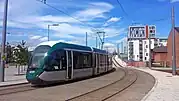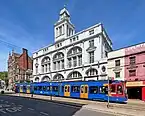Trams in England encompass various tram networks integrated into the public transport system of England. Until 1935, there had been a large and comprehensive network of tram systems in towns and cities.
Most of the country's tram systems were replaced by bus services in the 1930s or shortly after the Second World War. England's tram systems were largely dismantled, and by 1960, only Blackpool Tramway survived.[1][2] Since the 1990s, trams and light rail transportation have become increasingly common again, with a second generation of tram and light rail networks operating in cities and regions such as Manchester, Nottingham, Sheffield, London, and the West Midlands.[3]
Operating systems
The Docklands Light Railway is an automated light metro system serving the redeveloped Docklands and financial districts of London. First opened on 31 August 1987, the DLR has been extended multiple times, giving a total route length of 38 km (24 mi). Passenger numbers have greatly increased as the network has expanded, and in the financial year 2019/20 there were 116.8 million passenger journeys.[4] Tramslink is a light rail tram system serving the areas in South London. It is owned by London Trams, part of Transport for London. The network consists of 39 stops along 28 km (17 mi) of track, on a mixture of street track shared with other traffic, dedicated track in public roads, and off-street track consisting of new rights-of-way, former railway lines, and one right-of-way where the Tramlink track runs parallel to Network Rail lines.[5]
West Midlands Metro is a light rail tram system in the county of West Midlands. Opened on 30 May 1999, it currently consists of a single route, Line 1, which operates between the cities of Birmingham and Wolverhampton via the towns of Bilston, West Bromwich and Wednesbury, running on a mixture of reopened disused railway lines and on-street running in urban areas. The line originally terminated at Birmingham Snow Hill station, but with extensions opened in 2015 and 2019, now runs into Birmingham City Centre to terminate at Centenary Square, with a further extension to Edgbaston ongoing since 2021. Extensions to Edgbaston at the southern end and Wolverhampton railway station are under construction with passenger services.[6] Construction of a new Line 2 & 3 was approved in March 2019 and started in February 2020 for the Commonwealth Games. Following the opening of the extension into the city centre in 2016, usage increased sharply.[7] Figures for 2016/17 showed passenger numbers rose to over six million.[8]
The Sheffield Supertram is a light rail tram network, covering Sheffield and Rotherham. The infrastructure is owned by the South Yorkshire Passenger Transport Executive (SYPTE), from 2008, interest had been expressed in hybrid tram train operations, which would be able to use sections of the mainline rail network as well as tramways. The Supertram network now consists of 50 stations across four colour-coded lines, the Blue, Purple, Yellow and Tram-Train (Black) routes, which connect with local and national bus and rail services and six park and ride sites.[9]
Metrolink is owned by the public body Transport for Greater Manchester and integrated in the Bee Network. The network has 99 stops along 103 kilometres (64 mi) of standard-gauge rout making it the most extensive light rail system in England and one of the largest in Europe.[10] Metrolink is operated by a fleet of high-floor Bombardier M5000 light rail vehicles.[11] Each service runs to a 12-minute frequency; stops with more than one service experience combined frequencies of 6 minutes or less.[12] At the busiest times some services operate as 'doubles', with two vehicles coupled together.[11] In 2019/20, 44.3 million passenger journeys were made on the system.[13] The Greater Manchester Combined Authority has proposed numerous further expansions of the network, including the addition of tram train technology to extend Metrolink services onto local heavy-rail lines.[14]
Coventry Very Light Rail is a planned light rail tram system in Coventry. The first line of the system is set to be operational by 2024.[15] Further expansion of the network is intended after this point to cover various commercial, residential, and industrial districts, as well as linking up with other transit hubs. The concept has been developed as a means of delivering a light rail system at a much lower cost and with much reduced construction times than traditional tramways or light rail systems.[16] The system has been engineered for compatibility with the existing West Midlands Metro mass transit network.[16][17] The vehicles are to be equipped with batteries; when combined with rapid charging systems, the need for overhead line equipment to be installed throughout the route is dispensed with, resulting in reduced installation costs.[18] Being electrically powered, it produces zero emissions and is therefore an environment-friendly means of transportation.[18] The concept for this mass transit system originated from the Warwick Manufacturing Group (WMG), an institution that is closely associated with the University of Warwick.[19]
| Location | System | Traction
type |
Date opened |
|---|---|---|---|
| Blackpool | Blackpool Tramway | Electric | 29 September 1885 |
| South London | Tramlink | Electric | 10 May 2000 |
| East London | Docklands Light Railway | Electric | 31 August 1987 |
| Greater Manchester | Metrolink | Electric | 6 April 1992 |
| Nottingham | Nottingham Express Transit | Electric | 9 March 2004 |
| Sheffield and Rotherham | Supertram | Electric | 21 March 1994 |
| Newcastle upon Tyne and Sunderland | Tyne and Wear Metro | Electric | 11 August 1980 |
| West Midlands | West Midlands Metro | Electric | 30 May 1999 |
See also
References
- ↑ "January 1886: Blackpool's electric trams". The Engineer. 2014-01-29. Retrieved 2023-10-08.
- ↑ Reith-Banks, Tash; Swann, Glenn (2018-08-24). "In praise of the tram: Britain's lost network and the future of transport". The Guardian. ISSN 0261-3077. Retrieved 2023-10-08.
- ↑ "A Light Rail Strategy for the UK" (PDF). UK Trams.
- ↑ "Light rail and tram statistics (LRT)". Department for Transport. 25 June 2020. Retrieved 11 July 2020.
- ↑ "London Trams". Transport for London. Archived from the original on 8 November 2016. Retrieved 9 November 2016.
- ↑ Ltd, DVV Media International. "Midland Metro Alliance to manage tramway expansion projects".
- ↑ "Midland Metro numbers jump by a third after Birmingham extension". Express & Star. Retrieved 23 March 2017.
- ↑ "Light Rail and Tram Statistics: England 2016/17" (PDF). Department for Transport. Retrieved 30 June 2017.
- ↑ "Sheffield Supertram". UK Tram. Retrieved 2023-10-09.
- ↑ "New Metrolink line to Wythenshawe and Manchester Airport to open on November 3 – a year ahead of schedule". Manchester Evening News. 13 October 2014. Archived from the original on 18 October 2014. Retrieved 2 November 2014.
- 1 2 Tramways & Urban Transit (15 February 2019). "Evolving the M5000". Archived from the original on 15 January 2020. Retrieved 30 September 2021.
- ↑ "Metrolink tram times". Transport for Greater Manchester. 19 January 2019. Retrieved 19 January 2019.
- ↑ "Light Rail and Tram Statistics: England 2018/19" (PDF). Archived (PDF) from the original on 2 July 2019. Retrieved 20 June 2019.
- ↑ "Place North West | Metrolink heads to Stalybridge and Middleton in 2040 expansion". Place North West. 2019-01-07. Retrieved 2021-10-06.
- ↑ "Trams to run on Coventry's streets for first time since The Blitz". Coventry Telegraph. 14 March 2019. Retrieved 16 March 2019.
- 1 2 "Coventry Very Light Rail (CVLR)". railway-technology.com. Retrieved 23 August 2020.
- ↑ "Coventry light rail design deal awarded". New Civil Engineer. 18 January 2018. Retrieved 17 March 2019.
- 1 2 "Coventry Very Light Rail (CVLR)". railway-technology.com. Retrieved 23 August 2020.
- ↑ "Trams to run on Coventry's streets for first time since The Blitz". Coventry Telegraph. 14 March 2019. Retrieved 16 March 2019.


.jpg.webp)
